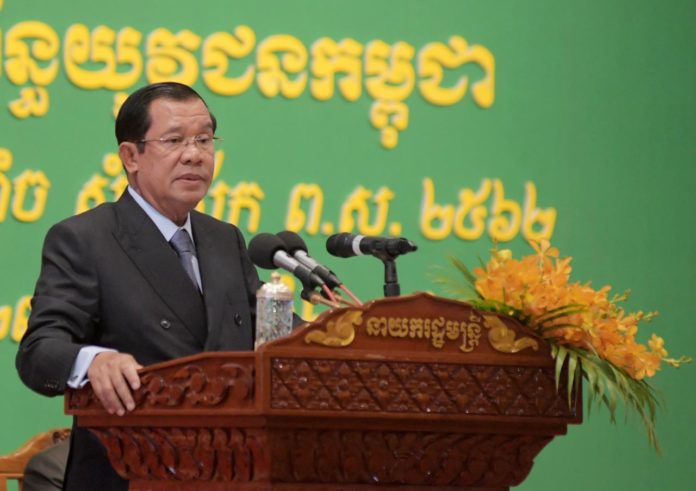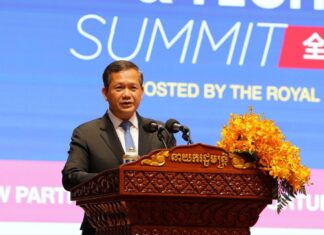UYFC – a Non-governmental Organization Opens for Youth Participation
My wife and I are so happy today to participate in the closing of the fourth congress of the nationwide representatives of the Union of Youth Federations of Cambodia (UYFC) […] I have heard some comments on some radios and press about neutrality of this organization […] I may remind those in the oppositions that UYFC is a non-governmental organization and open to youth of every composition who wish to be a part of it. If they do not wish to be a part of it, it is up to them. In lieu that they set up an organization in their support, they would not provide chance for youth of the ruling party to take part too. That is the fact […] they should be clear on that since they have been talking about UYFC brings together children of the ruling party’s leaders. Where else should we recruit them? We have our way of doing it […]
Youth of Previous Generation Created Army and Established NUFSK
We can say that in every success or victory, there has been participation from our youth, a part of which is member of the UYFC. I wish to take this opportune moment to express my sincere thanks and appreciation for its involvements at central, sub-national and local level. I am proud of what this mass organization has been doing to unite and create a strong national movement. Our youth here have been serving in civilian, army, police, and military police. It is an organization that receives volunteers in actions in every field […] if I am not wrong, the congress of the National United Front for Salvation of Kampuchea (NUFSK) was in progress at this time (in 1978) and I was the MC of the congress. Along with its task to reveal the establishment, I myself had become head of the youth wing, and the one taking responsibility on mass organization and foreign affairs.
Actually, 2 December 1978 was only the day when we proclaimed officially the establishment of the NUFSK, which we will be celebrating its fortieth foundation this year. However, they should not forget that youth activities started even before this date. A group of youth in the province of Koh Kong led by the late HE Say Phu Thong, Samdech Tia Banh is also present here, also rebelled in late 1974 against Pol Pot’s pressure at the time. It is considered a part of the youth movement to rise against Pol Pot. In 1975, in the northeast, led by Bun Mi, Bu Thong, and others also rebelled (against the regime). On 20 June 1977, I led a movement myself to form and establish an army of about ten thousand men […] Finally, Samdech Chea Sim and Samdech Heng Samrin, on 25 May 1978, seceded and revolted against the regime in the east. That was a gold and diamond opportunity for our youths of that generation to hold hands together to form up army coming from all parties and to establish NUFSK […]
CPP to Convene Nationwide Central Committee Plenum from 19-21 December
From 19 through to 21 December, the Cambodian People’s Party will convene a nationwide plenum of its central committee. What party in Cambodia would have three days for its congress or plenum? The longest they would do would be half a day […] as a real political organization, we needed this much time […] in order to call for the central committee plenum from 19 through to 21 December, we had to figure out when we could have a meeting of the permanent committee, and we had set it for 3 December to decide on a draft report and directives for the central committee to study and adopt […] the Party’s president is not the most important person. The congress of the Party is its highest organization. From one congress to another, the central committee will take the responsibility before the congress and in between central committee plenums, there is this permanent committee […]
Leaders Must Sacrifice, Life Even, for Future of Nation
To be a leader is not a simple matter. To become one, one has to sacrifice, and the sacrifice could be very high, even life too, for the future of nation and peaceful life of people. I may speak only from my personal experiences, which is ones that is growing along with the growth of this nation. I may warn you that “there is no such thing as benefiting without paying cost” […] there are many fallen combatants – men and women, for the sake of national peace. They sacrificed their lives. You must remember that to come this far we had lost many lives – either from killing or fighting […] as for me, I have used my life to trade for what we have today. I may bring up three points for you – firstly, trading life on 20 June 1977. I was fully aware that I could face death for staying or for leaving the country […] however, it is a task that I cannot fail to accomplish. In late 1977 and early, 1978, my troops were still clashing with the army under Heng Samrin’s command.
I will talk about the third point as for the second point, I will compile it as document for presentation in the near future. Thirdly, the final phase of win-win policy. We all knew how dangerous the Khmer Rouge stronghold could be, but we had had to go […] my mother and my aunt came warning me before I set for the Khmer Rouge stronghold. I told them if that would be the case, only my life and life of my companions would lose. However, if it would not be the case, Cambodia will be whole again. That was the price that we had had to pay. I was not killed. Unfortunately, there was an attempt on my life in Siem Reap. I forgive them already, though I have leads to those behind it. I do not want to bring it back. I just warn them that anyone wished to destroy Hun Sen would face annihilation […]
Political and Economic Reforms Walked in Tandem
I nurtured my ambition since when I was Minister of Foreign Affairs (to seek for political negotiation) since I understand that war would not end another war. As a real experience, I think you all should pay attention to the fact that we were conducting political and economic reforms in tandem. Politically, we opened political and diplomatic offensive in order to reach a negotiation for reconciliation between Sihanouk and Hun Sen at Fere-en-Tardenois, France […] you may ask if Hun Sen did not make effort, though there were supports from other leaders like Chea Sim, Heng Samrin, Say Phuthong, would that be realized? […] I never hesitate. I would go everywhere to talk things out to stop loss of Khmer lives.
We transferred the country’s development from being entirely at war to fighting and negotiating at the same time. Economically, we transferred gradually our reform process in the field of agriculture. I went to Takeo often to learn from Pol Sarouen about how he solved problem regarding land conflict. Later, market economy grew. The Constitution in those days recognized in 1981 only three economic compositions – state, collective, and family. We changed it later […] you may read my book “Ten Years of Cambodia’s March” […] I remember instructing the Minister of Industry then, HE Ho Naun, on her request to close down private workshop producing outer covers of bicycles, that I’d rather the state company to close instead. I wrote “the fear we are concerned here is not businessmen but people’s poverty.” It was on this note that I allowed political and economic reforms to happen altogether.
Three Pressing Forces on Hun Sen on Reforms
Let me discourse to you about our trip in the last 40 years since it had not been an easy one. It was full of changes and endeavoring. We are working on transformation but keeping solidarity, internal unity of the party, and moving forwards without backtracking and did not anyone one party to replace us in doing so. However, in the course of doing that, there were three vital and life-threatening pressing forces hanging on me. Firstly, lack of understanding among peers. Not many people knew what would be the free market economy or political negotiation. In those days, the Ministry of National Defense commented on the move for negotiation as to destroy revolutionary achievements […]
I was lucky though that I have supports from Say Phuthong, Heng Samrin, Chea Sim in doing these important tasks to search for political settlement by means of opening for political and economic reforms based on what we have in fact […] this is the first dangerous pressing force and I had passed it. This experience suggests that no matter how hard it could be, we must try to make peers understand […]
What is the second pressing force? Whole Cambodia conducted reforms, there were still about 100,000 Vietnamese soldiers in Cambodia. It was not that simple. Vietnam did not yet open its country on a Doi Moi policy […] we were lucky that Vietnam respect our sovereignty. They only defend our people from the return of the Pol Pot’s regime but they never involved in Cambodia’s decision on what to do with its economy […] for what happened and I discovered in Kompot has led to my discussion with the Vietnamese leader to withdraw their experts in June 1988. On this note, you may see that though Cambodia and Vietnam were on different pages on their politic and economic development methodology, they have not become obstacles to Hun Sen’s move to reform the country. In those days, should Vietnam disrespect people’s decision for changes/reforms, I could have been in difficulty. I thank Vietnam for respecting the Cambodian people’s decision […]
What would be the third pressing force? You all might have known about the fact that Cambodia then received assistance from the COMECON/CMEA, which comprised of countries in Eastern Europe. The then Soviet Union had not yet gone through Mikhail Gorbachev’s perestroika and glasnost. It is known to everyone that […] it was the time of negotiation between China and the Soviet Union. They pointed fingers at each other about who were on the course of revisionism […] our biggest source of assistance was from the Soviet Union and countries in Eastern Europe. Should the former Soviet Union, then were working on mobilizing countries to pursue socialism, see that Cambodia was going on a different direction, Hun Sen could be in danger. They just said that if Hun Sen stayed on as President of the Council of Ministers, they would cease their assistance. That would be enough to complicate things […]
No More War of Words
Tonight, do not be surprised, one radio will invite some people to comment on my speech. I must remind you that there is no need to fire words in return. There is one person who kept pestering me with his postings expecting that I will return the favor. I no longer talk to him. I am aware that your importance has worn out. His remaining option is to pester me to engage in war of words with him […] we will not talk with him because doing so will give him credibility […]./.






![Special Lecture by Samdech Akka Moha Sena Padei Techo HUN SEN, President of the Senate of the Kingdom of Cambodia, on “Leadership Experiences and Vision for Peace” to the 11th Plenary of the International Parliament for Tolerance and Peace (IPTP) [Unofficial Translations]](https://pressocm.gov.kh/wp-content/uploads/2024/12/468161445_1188047276010391_3141496335218348185_n-100x70.jpg)
